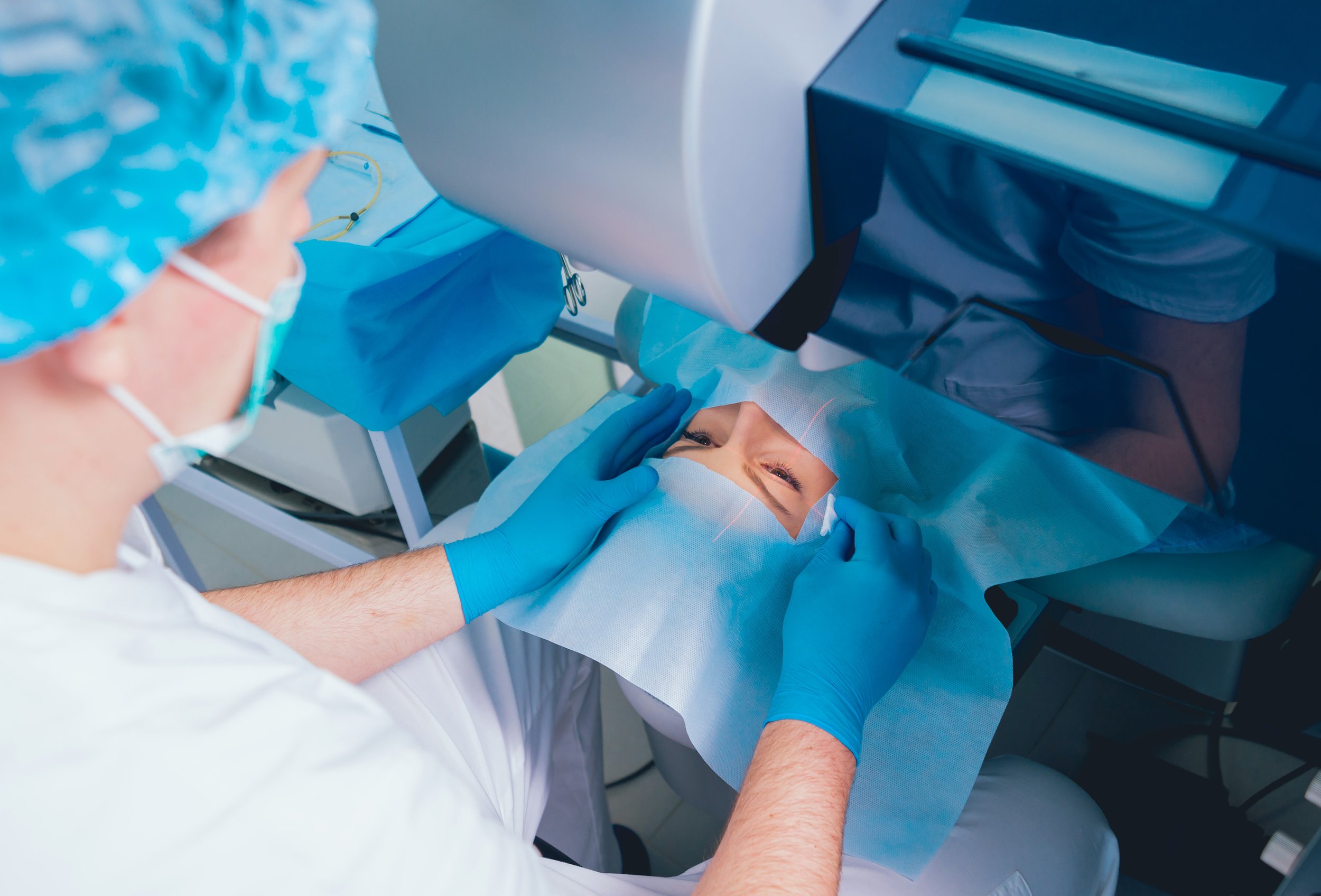
LASIK
See the Beauty of your World with Visual Freedom
What is LASIK?
LASIK, which stands for Laser-Assisted In Situ Keratomileusis, is a surgical procedure used to correct vision problems, particularly nearsightedness (myopia), farsightedness (hyperopia), and astigmatism. The goal of LASIK is to reduce or eliminate the need for glasses or contact lenses by reshaping the transparent front part of the eye called the Cornea.
LASIK is known for its quick recovery time with many patients experiencing improved vision within 8 hours after the procedure. It's important to note that LASIK may not be suitable for everyone, and a comprehensive eye examination is required to determine eligibility.

How is LASIK Performed?
A thin flap is created on the cornea using a femtosecond laser. This flap is lifted to expose the underlying corneal tissue. An excimer laser is then used to remove a specific amount of corneal tissue, precisely reshaping the cornea to correct the refractive error. After the cornea is reshaped, the flap is carefully repositioned, where it begins to heal without the need for stitches. It takes about 15 minutes to perform LASIK for both eyes. Nearly all cases of LASIK are pain-free.

Take a Quick LASIK Self-Assessment Quiz
👁️ Am I a Candidate for LASIK?
Answer these quick questions to find out if LASIK might be right for you.
Your LASIK Journey: Step-by-Step

Advanced Technology & Surgical Expertise You Can Trust
-
We use some of the most advanced laser systems available today:
VisuMax® Femtosecond Laser – Renowned for its precision, speed, and comfort during flap creation in LASIK and for performing SMILE.
SCHWIND Amaris® Excimer Laser – German-engineered for exceptional accuracy and customised treatments tailored to your unique corneal profile.
-
We offer a range of options to suit your eyes, lifestyle, and prescription:
LASIK – Fast, effective and minimally invasive laser vision correction
SMILE – A flapless, next-generation solution for myopia
PRK – Ideal for patients with thinner corneas or active lifestyles
ICL (Implantable Collamer Lenses) – A safe and reversible alternative to laser for higher prescriptions or dry eyes
-
Dr. Thariq Bagus is an experienced refractive surgeon who has performed thousands of vision correction procedures. He is:
A certified Fellow of the World College of Refractive Surgery & Visual Sciences
Highly trained in Femto-LASIK, PRK, and ICL implantation
Dedicated to delivering personalised care with exceptional outcomes
Whether you’re seeking freedom from glasses or looking for the safest option for your eyes, you’re in expert hands.
Watch a Real-time LASIK Surgery
(not for sensitive viewers)

Why get LASIK?
LASIK has a transformative impact on vision and quality of life, offering the prospect of clear eyesight without the encumbrance of glasses or contact lenses. Beyond the immediate convenience and lifestyle enhancement, LASIK also represents a long-term investment in vision. The procedure can be particularly advantageous for individuals in professions where unaided vision is important, such as the military, law enforcement and aviation.
Implantable Collamer Lenses are good alternatives if you are a poor candidate for laser vision correction
Frequently Asked Questions
-
The cost of Laser Vision Correction varies depending on what is required. The average price of a standard LASIK procedure is R40000. The cost of a comprehensive eye exam to determine candidacy is typically R5000.
-
Most medical aids consider Laser Vision Correction to be a lifestyle procedure so typically it is not covered. However, some medical aid plans offer partial refractive surgery benefits.
-
The best way to find out if you’re a candidate is to have a consultation with our refractive surgeons. We will examine your eyes, perform special tests and discuss your vision goals to determine whether LASIK is right for you. There are certain people who should not have Laser Vision Correction including:
• Persons under the age of 18.
• Pregnancy or breastfeeding.
• Patients with certain medical conditions such as uncontrolled autoimmune diseases, severe ocular surface disease etc.
-
Laser Vision Correction procedures are among the safest and most successful surgeries performed worldwide. When patients are properly screened and modern technology is used the risk of vision threatening complications is very low. Some of the more common risks include:
Dry Eye
Most patients experience temporary dry eye after LASIK (aka STODS – surgical temporary ocular discomfort syndrome). In almost all cases it resolves over a matter of weeks and is relieved with the use of artificial tear drops. It is rare for dry eye to be a long-term side effect.
Night Vision Symptoms
Glare, haloes and starbursts at night are common in the early healing period but improves over a few weeks.
Under/over Response
It is possible for biological tissues to behave differently to laser treatments than expected. If this happens one may still have a residual refractive error after performing LASIK. If this occurs, it is possible to have an enhancement laser to “fine-tune” the result.
-
The eyes are numbed with anaesthetic eye drops before the procedure, so you feel nothing more than a bit of pressure. A few hours after the procedure you may feel a bit of scratchiness and light sensitivity. Many patients feel comfortable enough return to work the following day.
-
We recommend taking 2 days off work when having LASIK. The day of the procedure and the following day. However, many patients feel comfortable enough to return to work the day after LASIK. Certain laser procedures such as PRK typically take 3 to 5 days to heal.
-
You do not need to wear sunglasses after LASIK but it will help you feel more comfortable by reducing the light sensitivity immediately after the procedure.
-
It is advisable to minimize screen time immediately after having LASIK. The best thing you can do after the procedure is to take a nap. After waking up a few hours later your vision will be clearer.
-
It is safe to shower or bath after LASIK but it is advisable to avoid touching the area around your eyes for the first 24 hours after the procedure.
-
The most important thing to avoid immediately after LASIK is eye rubbing. If you accidentally rub your eye and start experiencing pain or blurred vision, contact your surgeon immediately. It is advisable to avoid high-impact sports, swimming and eye makeup for 2 weeks after LASIK.








